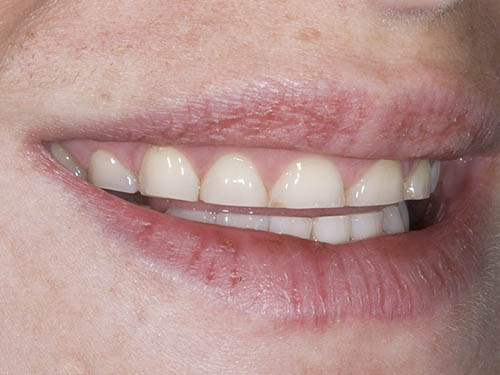
Even when patients diligently brush and floss their teeth, certain habits like tooth gnashing can cause significant dental problems. For example, habitually gnashing teeth can wear down a tooth’s natural defenses, leading to a host of dental problems that can destroy your smile.
Clinically known as bruxism, habitual teeth grinding is more common than many patients realize, affecting approximately 15-33 percent of children in the United States (according to WebMD) as well as many adults.

Heavily worn teeth from tooth gnashing
What is Bruxism (Tooth Gnashing)?
The simple act of gnashing teeth is common, usually in situations when a patient is physically tense due to stress or anger. If teeth are strong and healthy, then these occasional moments shouldn’t cause significant damage. Patients with bruxism grind their teeth together continually, often while they sleep at night. Experts believe the most significant cause of bruxism may be excessive stress and anxiety in a patient’s life. However, certain dental conditions, including crooked or missing teeth, can create an imbalance in your bite and lead to unconscious grinding in unsuspecting patients.
Excessive Tooth Wear and Damage
The resilient enamel that surrounds and protects your teeth is meant to withstand a great deal of pressure. Made mostly of calcium and phosphate minerals crystals, tooth enamel relies on a steady supply of minerals from your teeth to remain strong. The protective layer is your teeth’s first line of defense against infectious bacteria and helps teeth absorb the pressures of biting and chewing food. When teeth grind together, the friction can scrape away the enamel, and eventually, the dentin underneath that makes up the tooth’s main structure. Excessively worn shorter teeth can further throw your bite off balance, and continued gnashing can lead to cracked, fractured, broken, loose, or lost teeth. Technological improvements in porcelain has now given us the chance to make veneers that work well with bruxism.
An Increased Risk of Tooth Infection
Usually, tooth decay and cavity development begin with acid produced by oral bacteria that wears down your teeth’s enamel (acid erosion). The process may take time, and it will only occur if poor hygiene habits allow bacteria the time to infect your teeth. If enamel is worn down due to bruxism, then tooth decay can develop much quicker as bacteria swarm the exposed tooth structure.
TMJ Disorder and Bruxism
Teeth aren’t the only parts of your smile to suffer from continuous gnashing. The joints and muscles that power your jaw are also designed to withstand a high, though limited, amount of bite pressure. Your temporomandibular joints (TMJs) connect your lower jaw, or mandible, to the temporal bones located just below each ear. TMJ disorder describes a dysfunction with these joints and the muscles that surround them, often due to a bite imbalance and/or chronic bruxism. Interestingly, bruxism is both a cause and a symptom of TMJ disorder. Excessive grinding can damage the jaw’s joints, leading to jaw, mouth, and facial discomfort, as well as chronic headaches and earaches. Conversely, a jaw suffering from TMJ disorder can shift constantly or experience muscle spasms that cause teeth to grind together.
How to Treat Habitual Tooth Gnashing
Unlike tooth decay and gum disease, there isn’t one specific treatment each stage of bruxism. The causes and effects of the condition are different for each patient, and treating bruxism often depends on addressing an underlying dental issue. For many patients, stress relief techniques can help alleviate jaw tension and pressure, halting the habit and reducing the risk of dental and overall health problems. Dr. Fondriest also offers a custom made oral appliance, similar to a sports mouth guard, designed to protect your teeth from each other while you sleep. Many find that wearing a mouth guard will offer relief of your jaw pain.
Cosmetic and Restorative Treatment Options for Worn Teeth
Our office offers two treatment options to restore teeth that are worn from excessive clenching: no prep veneers and dental crowns. Veneers are ideal for damaged anterior teeth. Crowns may be better suited to address worn molars.
Modern advances in dentistry now allow for porcelain veneer placement without the need to remove enamel. Traditional veneers require that the front of teeth be “prepped,” a process that involves drilling on the teeth. No prep veneers use the most advanced porcelain available on the market. The ultra thin ceramics are as thin as .2 mm and are very strong and durable. Most porcelain veneers are brittle. The non-brittle porcelain material we use bonds to your teeth without cracking. This allows your natural tooth to be preserved. In many cases, there is no need for local anesthesia when placing no prep veneers.
Our office also offers dental crowns that can be manufactured from multiple materials. Our dentist generally prefers ceramic crowns over metal. Ceramic crowns are more aesthetically pleasing. There is a lower risk for the development of a black line at the gum line. Ceramic restorations can also be made thinner, which requires less tooth reduction, and they will not stain or change color. Ceramics are more bio-compatible than metal which may reduce gum recession. the newest ceramics can stand up to chronic tooth gnashing.
E Max crowns offer the best cosmetic results. They are made of two layers: a strong and durable supporting layer called the coping and a lifelike top layer that matches the restoration to the natural teeth. We also offer zirconium crowns, which are considered to be the strongest material available for dental crowns.
Learn more about tooth gnashing
Dr. Fondriest combines his impressive array of experience with modern technology and caring, compassionate, and knowledgeable staff. No matter how worn your teeth are from tooth gnashing, we have a restorative or cosmetic treatment to address your worn teeth. To schedule your consultation, call our office today at (847) 234-0517.
